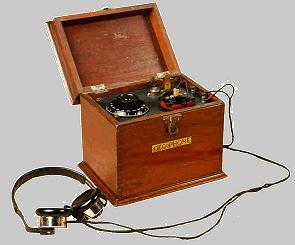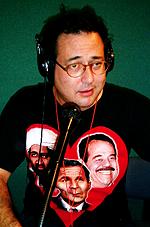"Were it left to me to decide whether we should have a government without newspapers, or newspapers without a government, I should not hesitate a moment to prefer the latter."
~ Thomas Jefferson, 1787
Of course, the founding fathers could have not conceived of the birth of the newspaper of the 21st century: the Internet.
Just, a few years ago many heralded the rise of the Internet as the new economy on Wall Street. But then came the bursting of the Internet bubble. And many people, who had become millionaires just a few years earlier, were bankrupt. The Internet had lost its shine for many.
 This must have come as a relief to the old guard mass media.
This must have come as a relief to the old guard mass media.
But I believe that recent events could point to a silent revolution in the making as television is voluntarily abdicating its place as the leader in making public opinion in American society.
Are American TV broadcast news networks losing their credibility? And could they be choosing this course under their own volition?
When I was a young boy I often heard people say about something they had read in a newspaper or magazine:
"Well, they couldn’t print it, if it were not true!"
We know that this statement is laughably false. But I wonder where people got this kind of idea in the first place? Was it a left over from the hey-day of newspapers?
The first American newspaper appeared in Boston in 1690, entitled Publick Occurrences. Published without British consent, it was immediately suppressed, its publisher arrested, and all copies were destroyed.
The first somewhat successful newspaper in America, the Boston News-Letter, arrived in 1704 and was heavily subsidized by the colonial government.
 First AM radio (1906)
First AM radio (1906)
At the start of the Revolutionary War, about two dozen papers were in print at all the colonies. Articles in colonial papers were written by various colonial propagandists. Some promoted reconciliation with the British and some demanded independence. But whatever the editorial policy, these papers were a major force in making American public opinion.
By the 1830’s, advances in printing and papermaking technology led to an explosion of newspaper growth, which gave rise to the “Penny Press.” This made a system of newspaper delivery and circulation that was so cost effective that it allowed the average American to get the news "hot off the presses" at an affordable price.
After newspapers reigned king for many years as opinion maker, they began to lose favor to many from the first widely used electronic media: the radio. In many ways, this was good as information could be distributed faster, but since radio is a passive form of information, it lends itself more to news being distorted or not being covered in depth as much as a print medium could do.
 At its beginning, radio played music and talk but around 1940, the radio became the king of the dissemination of information, and dis-information as the case may be, when it began broadcasting news and dramas.
At its beginning, radio played music and talk but around 1940, the radio became the king of the dissemination of information, and dis-information as the case may be, when it began broadcasting news and dramas.
An interesting side note here is that the sinking of the Titanic was actually very beneficial for radio broadcasting as the Law of 1912 required all ships to have two working radio transmitters and two operators on duty at all times.
Then radio lost out to television by the early 1950’s. The "Golden Age of TV" started in the late 1950’s and continues to this day as the main source for the average person to get the news.
But, I wonder: Could we be witnessing the end of this age, right now, before our very eyes?
The rationale for TV being a more credible source for the news than the radio was not only was it nearly as fast as the radio, but it had pictures. And "seeing is believing" or so the saying goes.
 When I was a college student, I remember that in a particular class, the discussion was: "Could Nazi Germany have happened in this day of electronic (TV) media?" Us bright eyed and bushy tailed college students came up with the conclusion that it would not be possible for such a thing to happen due to the influence of TV.
When I was a college student, I remember that in a particular class, the discussion was: "Could Nazi Germany have happened in this day of electronic (TV) media?" Us bright eyed and bushy tailed college students came up with the conclusion that it would not be possible for such a thing to happen due to the influence of TV.
TV was to the world a revolution of ideas and a way to get the truth out to people; TV was a medium that would fall governments and expose deceit.
Or so we thought.
Events over these last few years have proven just how wrong we students were in our idealistic thoughts.
In school, I studied television broadcasting. I enjoyed it immensely. But it did do one thing to me that is good or bad, depending on how you view it: I can no longer watch any movie or TV show and "suspend my disbelief" over what I see. I dissect everything: Where is the director sitting; where are the lights; what kind of script is being used; are the on-air talent good or bad?
Then I started working in this mass media business and I became even more skeptical of anything and everything I saw. I remember watching Rush Limbaugh’s TV show way back when and feeling like I was watching "pro-wrestling." It was so "staged."
And yet the people I watched it with were believing every word and action as if it really were unrehearsed and un-scripted.
 Anyone who works in the mass media, knows that nothing on the TV is to be believed. Everything is suspect. And if they were honest about it, they’d tell you so.
Anyone who works in the mass media, knows that nothing on the TV is to be believed. Everything is suspect. And if they were honest about it, they’d tell you so.
I am reminded of a TV news program from the 1950’s when Chesterfield cigarettes sponsored the evening news. Of course with a cigarette company as a sponsor, it stands to reason that a news broadcast could never have a story about the health risks of smoking.
No news program could be totally fair and balanced if that particular station has paid sponsors, whether or not those sponsors pay for commercial time on the news.
Even if sponsors don’t actually pay for commercial time on that station’s news program, per se, the stations will risk the wrath of the sponsors of their other programs if their news program exposes some negative publicity for a sponsor.
For example, say "Acme company" sponsors a drama on my TV station, yet my station’s six o’clock news reports some story that might be damaging to the reputation of "Acme company," Do you think my sponsor will pull their sponsorship of my drama? Well, as management of that TV station, taking a chance on losing that money from a sponsor is a risk too big to take.
 In 1955, former British Prime Minister Winston Churchill was going to announce his retirement from politics. An American news station sent a team out to interview Churchill and, instead of his trademark cigar, they had asked him to smoke a Chesterfield cigarette during the interview. He was insulted and refused. Even though the interview was taped, it was not aired on American TV. Its broadcast wasn’t cancelled by Churchill. It was cancelled by Chesterfield because Churchill refused to hold one of their cigarettes!
In 1955, former British Prime Minister Winston Churchill was going to announce his retirement from politics. An American news station sent a team out to interview Churchill and, instead of his trademark cigar, they had asked him to smoke a Chesterfield cigarette during the interview. He was insulted and refused. Even though the interview was taped, it was not aired on American TV. Its broadcast wasn’t cancelled by Churchill. It was cancelled by Chesterfield because Churchill refused to hold one of their cigarettes!
 Sponsors don’t care about the truth. Actually, one might consider it to be none of the business of the sponsors. The business of sponsors is to sell product and make money.
Sponsors don’t care about the truth. Actually, one might consider it to be none of the business of the sponsors. The business of sponsors is to sell product and make money.
The question I have now is: Have the major American news networks voluntarily or unwittingly surrendered their credibility to society by what they choose to broadcast as "news"? Have the major news networks done a sort of "credibility Enron" right before our very eyes?
Do the major networks like Fox, CNN, ABC, CBS, make editorial TV news decisions taking into consideration the feelings of sponsors first?
Of course they do. That’s why American TV news "plays up to the audience" and broadcasts what people want to hear instead of the truth.
The truth is a difficult thing to hear or see. Showing the audience what they want to hear and see is the way to get ratings and, in turn, make money. And since television is a passive medium, like radio, it allows for more distortions as subjects can and are covered with small sound and visual "bites."
 Here is a true episode that happened in the 1991 Gulf War: General Schwartzkopf was holding a press conference on CNN. He deliberately mis-lead viewers about U.S. troop movements because he knew that Saddam Hussein was watching CNN too.
Here is a true episode that happened in the 1991 Gulf War: General Schwartzkopf was holding a press conference on CNN. He deliberately mis-lead viewers about U.S. troop movements because he knew that Saddam Hussein was watching CNN too.
 Schwartzkopf used the media to create a "reality." Was he lying? Or was he using the media to get what he wanted? Is what he did so much more different than the 1938 radio scandal by Orson Welles, "The War Of The Worlds"?
Schwartzkopf used the media to create a "reality." Was he lying? Or was he using the media to get what he wanted? Is what he did so much more different than the 1938 radio scandal by Orson Welles, "The War Of The Worlds"?
Even today, you can’t believe anything Bush, Rumsfeld, Cheney, Powell, Rice or any other politician says. They know that the "Medium is the Massage." They know that they only need to play to an audience who is passively watching and listening to their words.
Consider this: Are there no lies on TV because TV is inherently a part of a world of "make believe?" I’d like to hope not, at least in the case of TV news. But when our politicians can go on TV and make bold-faced lies over and over, one has to begin to wonder where these lies begin to damage the credibility of the TV as a broadcast medium as a whole?
Could average American society be waking up to the fact that "seeing is not believing?" In fact, could people be slowly changing their thinking so that: "If it’s on TV, then it’s not to be believed?"
What an excellent thing to happen, if true. Because the day people stop believing a passive medium, they may begin to read and, in turn, think more deeply about social and political problems.
Could this be the time that the hybrid of print media and broadcast media breaks out of it’s egg shell and dawns the new age of information dissemination? In other words, could this really be the dawning of the Internet as the next revolution in truthful news reporting?
Some people will think this notion is absurd. But, I’d like to point out that television was created in about 1923 and took about forty years from it’s birth to become the dominate form of mass media it has remained until this day.
Could print media (albeit an electronic one) be making a comeback in credibility?
And doesn’t a situation that requires people having to think and discuss opinions, rather than passively receiving information, actually hold many long-term benefits for society as a whole?
This brings me to an episode that happened here in Japan that I like to refer to as, "The Yo-yo Conspiracy." I’d like to use this one example of an event I witnessed and saw the effects it had on children around me.
About six years ago or so, I was watching a children’s TV show with my second daughter. She was an elementary school student at a typical Tokyo school.
On this particular children’s show they were talking about "trends" among the youth. The current trend, they claimed, was a "yo-yo craze."
They had several famous TV talent on this show. People who were popular among kids. And each and every one of these stars were claiming that "the yo-yo boom was going wild" (as if 20 to 22-year-old TV stars would know what 10-year-old kids like to do).
Of course, after hearing their spiels, the station then went to a commercial break. The first commercial was about — surprise! New yo-yo’s then on sale.
"Comical!" I thought.
At that time, I went to pick up my daughter from school every day and had never once seen any kids playing with a yo-yo. I did, though see kids playing with "Game-Boy" all the time.
I thought about the program and how this came about. I knew. I had been to TV show planning meetings many times: The manufacturer of yo-yo’s buys commercial time on a kids program. In return for that, the program promises to talk about yo-yos.
Sure enough, two months later, my daughter wanted a yo-yo.
"Everyone has one." She told me as she pleaded me to give her money. I did.
Of course, as any parent knows, my kid played with the yo-yo for maybe a day and that was that.
It’s kind of like a music magazine. Anytime you see a huge interview of any artist, keep your eyes open for a full-page ad later on in the same magazine for that same artist. It’s a barter system: The record company buys an ad, the magazine interviews the artist.
The average person sees this promotion and thinks:
"Wow! This artist is happening! I’ve got to buy this album."
You scrub my back. I scrub yours. It’s the way it is in the mass media: Big money changes hands and so big media pay back.
 Several years later, though, both my daughters were watching some TV show and I overheard one of them say:
Several years later, though, both my daughters were watching some TV show and I overheard one of them say:
"Oh this is so fake. You can’t believe anything you see on TV."
I was delighted. I wonder if they figured that out themselves or I had said a similar thing so many times that they became to believe me more than the TV?
Either way, a healthy skepticism of TV is quite a good thing.
 That’s why, I believe, we could be witnessing a quiet revolution: the true rise of the Internet and the return of the print media (in an electronic form.) They are both in sorry shape for money. This means that they have not as many concerns for playing to the audience and worrying about what sponsors think. The independent Internet-based news sites are always asking for money and donations.
That’s why, I believe, we could be witnessing a quiet revolution: the true rise of the Internet and the return of the print media (in an electronic form.) They are both in sorry shape for money. This means that they have not as many concerns for playing to the audience and worrying about what sponsors think. The independent Internet-based news sites are always asking for money and donations.
And it’s a good thing that they are poor. That means they will probably compete for a larger audience by selling credibility and quality.
 They are not in the pocket of big business… At least not yet.
They are not in the pocket of big business… At least not yet.
And that’s good for all of us.
A very special thanks to my first, and very best, professor of television studies, Mr. Alfred J. Miller at Moorpark College in California for the inspiration for this article.





